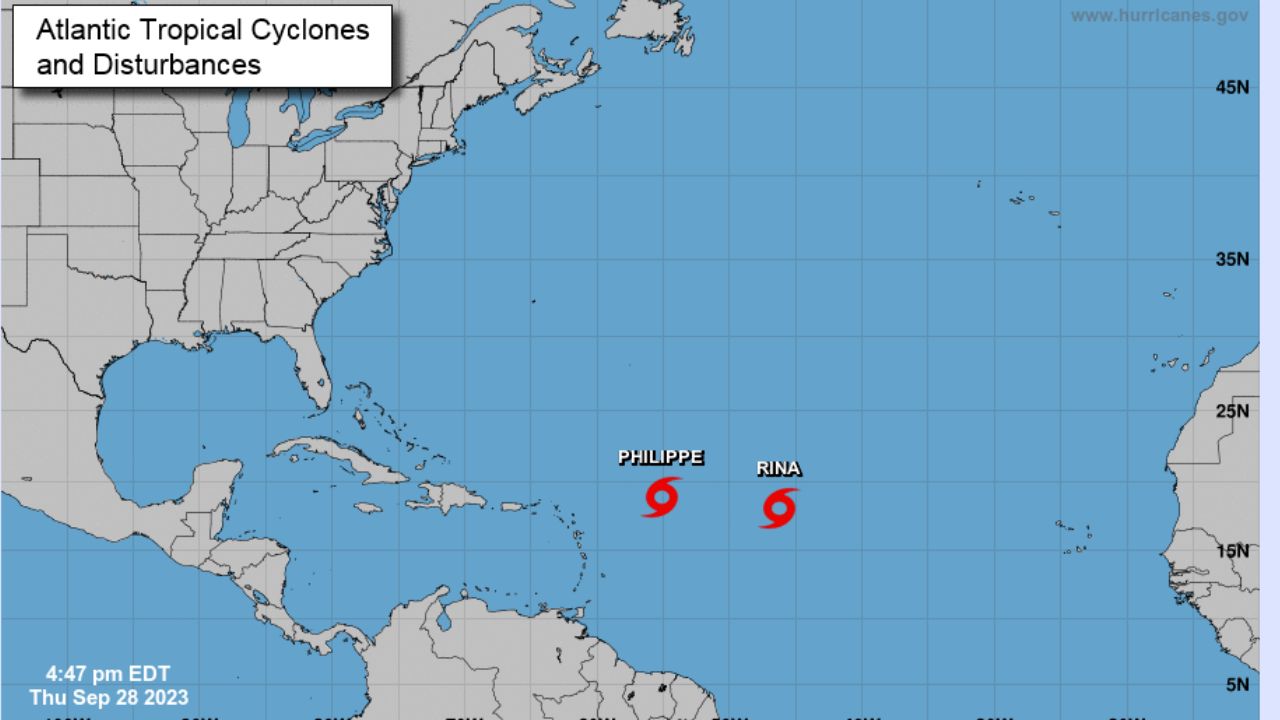
By The newspaper
Sep 28, 2023, 8:13 PM EDT
In a dynamic development over the Atlantic Ocean, the National Hurricane Center has raised the possibility of two tropical storms, Philippe and Rina, merging. While the outcome remains uncertain, the convergence of these climate systems has attracted significant attention.
As of Thursday morning, Tropical Storm Philippe was observed moving slowly over the Caribbean Sea. The National Hurricane Center’s 11 a.m. advisory reported that Philippe was expected to maintain its current speed while remaining east of the northern Leeward Islands.
At the time, Philippe was located approximately 560 miles east of North Sotavento, with maximum sustained winds reaching 50 miles per hour. Its west-northwest track, traveling at about 2 mph, was anticipated to continue in a west or southwest direction with minimal changes in strength for the remainder of the week.
A view of Tropical Storm #Philippe this morning via @NOAA’s #GOESEast satellite shows the system to the east of the northern Leeward Islands. The storm is expected to drift for the next few days, and there are currently no coastal watches or warnings in effect.
Stay updated:… pic.twitter.com/oPiLEVEPAw
— NOAA Satellites (@NOAASatellites) September 28, 2023
Following Rina’s path
In a very close sequence, Tropical Storm Rina emerged in the central region of the tropical Atlantic Ocean shortly after Philippe. At 11 a.m., Rina was positioned about 1,190 miles east of northern Sotavento, with maximum sustained winds of 40 mph.
Rina was heading north-northwest at a rate of about 10 mph, with a projected turn toward the west expected later Thursday or Friday. Additionally, Rina was anticipated to experience gradual strengthening in the coming days, as indicated by the hurricane center.
As of Thursday, neither Philippe nor Rina have activated coastal watches or warnings, and there are no immediate threats to land areas. However, forecasters have advised keeping an eye on the northern Leeward Islands, the US and British Virgin Islands and Puerto Rico, stressing the importance of monitoring Philippe’s progress.

The extent of tropical storm-force winds extended up to 60 miles from the center of Rina and up to 175 miles from the center of Philippe.
Forecasters noted that Philippe presented a challenging forecast due to his disorganized and elongated frame, with little confidence in his position. Additionally, the storm may no longer have a well-defined center, further complicating predictions.
While Rina is expected to maintain its tropical storm status over the next week, certain hurricane models suggest a potentially faster rate of intensification than projected by the National Hurricane Center.
However, the hurricane center anticipates that Rina’s continued wind shear and its proximity to Philippe, along with uncertain interactions, will limit its ability to strengthen significantly.
Binary interaction: the Fujiwhara effect
Philippe and Rina’s proximity has introduced the intriguing concept of binary interaction, often called the Fujiwhara effect. This rare phenomenon occurs when two tropical storms or hurricanes pass close to each other and engage in an intricate dance around a shared center.
In some cases, the stronger storm absorbs the weaker one, while storms of comparable strength may gravitate toward each other, either merging or engaging in a temporal dance before resuming their separate paths.
On rare occasions, this interaction results in the creation of a single, larger storm.
Keep reading:
· Tropical Storm Philippe strengthens and is expected to reach Puerto Rico
